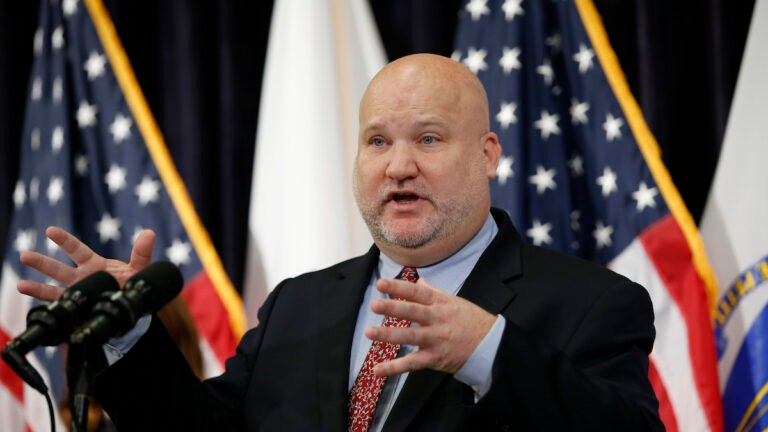DESE commissioner to recommend Boston schools be classified as ‘underperforming’
Here's what that means.

The latest on BPS
Following weeks of discussion between state education regulators, Mayor Michelle Wu, and Boston Public Schools officials on a plan for the district to improve on serious issues facing the city’s schools outlined in a report last month, the state’s education commissioner will recommend a state board deem the district as “underperforming” at a meeting next week.
In a memo to the Board of Elementary and Secondary Education, posted on the state’s website Friday, Commissioner Jeffrey Riley wrote the city and the state have been unable to reach agreement on provisions that would provide “independent oversight to ensure that the district is accurately and transparently reporting its data.”
And though the city, BPS, and DESE’s areas of agreement were “substantial,” they were “ultimately insufficient,” Riley wrote.
“Ultimately, I decided I could not sign onto to any improvement plan that did not contain an independent auditor reporting to DESE, where DESE determines the scope of the work, to verify the accuracy of BPS data,” he wrote.
Instead, Riley is recommending DESE vote to designate BPS as an underperforming district, effective July 1. The move does not take away the option of receivership — or a state takeover, a move many city leaders have strongly opposed — of BPS down the road, but Riley made clear that he is not recommending receivership at this moment.
The board is slated to consider a vote on the recommendation at its next meeting on Tuesday at 9 a.m.
“I believe designating BPS an underperforming district is the correct next step because it will provide the Mayor and incoming Superintendent an opportunity to address the serious deficiencies in the district, while at the same time giving DESE the necessary tools to ensure the integrity of the district’s data,” Riley wrote. “Placing a monitor inside BPS to review the district’s progress, including assessing the accuracy of the district’s data, will give families and stakeholders confidence in information showing BPS’s ability to deliver on necessary improvements.”
The disagreements between DESE and city and BPS leaders over how the district will respond to the significant concerns raised by the recent DESE report came into sharp focus this week, after Wu said Riley’s latest proposed improvement plan appeared to “backtrack and take us further apart.”
Wu’s office and BPS did not immediately respond to requests for comment on Riley’s recommendation on Friday morning. The memo arrived just at the start of a second day of public interviews for two finalists for BPS superintendent, with the School Committee expected to decide on who will be the next schools chief at its meeting next week.
The data hang-up
As Riley wrote in his memo, hang-ups remain around hiring a data auditor.
Last month’s report found BPS was incapable of providing basic and core functions to students, and that data inconsistencies and inaccuracies plague the district, making it hard for DESE officials to gauge the school system’s improvement progress.
In a letter to Riley this week, Wu and school officials underscored that the city and BPS have agreed to hire an independent data auditor to be approved by DESE and have agreed to provide workspace for said auditor.
“We believe this meets and exceeds DESE’s stated goal of third-party access and stakeholder confidence without imposing a version of top-down control that would constitute a form of receivership,” the letter reads.
But Riley, in his memo on Friday, made clear that that position does not satisfy DESE’s concerns.
“Despite our good faith efforts, and after granting the City multiple deadline extensions, we were not able to reach consensus on the need for an independent data auditor hired and overseen by DESE, to verify that the district is accurately and transparently reporting its progress on key measures,” Riley wrote. “The City/BPS proposed to hire their own data auditor; however, this is insufficient as numerous such audits have not prevented ongoing inaccuracies with data.”
Ensuring that data is accurate and transparent in school districts is a “vital function” of DESE, especially because data is key to securing state and federal resources, he wrote.
“Above all, a solid foundation of data integrity is critical for the families of our students, who depend on accurate and transparent data to make essential decisions about their children’s education and wellbeing,” Riley wrote.
What an ‘underperforming’ status would mean
According to Riley, if BESE votes to designate BPS as an underperforming district, he would appoint “an assistance lead, an accountability monitor, and an individual or team to conduct monitoring site visits to the district.”
Additionally, Riley would notify BPS that it must develop an improvement plan and file it with DESE for approval.
“Once the Department approves the district’s plan, we would make available significant funds, up to 10 million dollars over a period of three years, to support BPS in this important work,” Riley wrote.
“Taking this step now does not foreclose other interventions, such as receivership, in the future, if BPS does not correct the serious deficiencies identified in the Follow-Up District Review Report,” he added.
Riley also made clear there are areas where he and Wu overlap, writing that the two had “collaborative, productive discussions.”
“I am confident that Mayor Wu and I share the same belief: that BPS needs bold, student-centered decision-making and strong execution to ensure the district delivers the quality education its students deserve,” he wrote.
Riley will answer any questions board members have at Tuesday’s meeting.
Read the full memo:
item1 by Christopher Gavin on Scribd